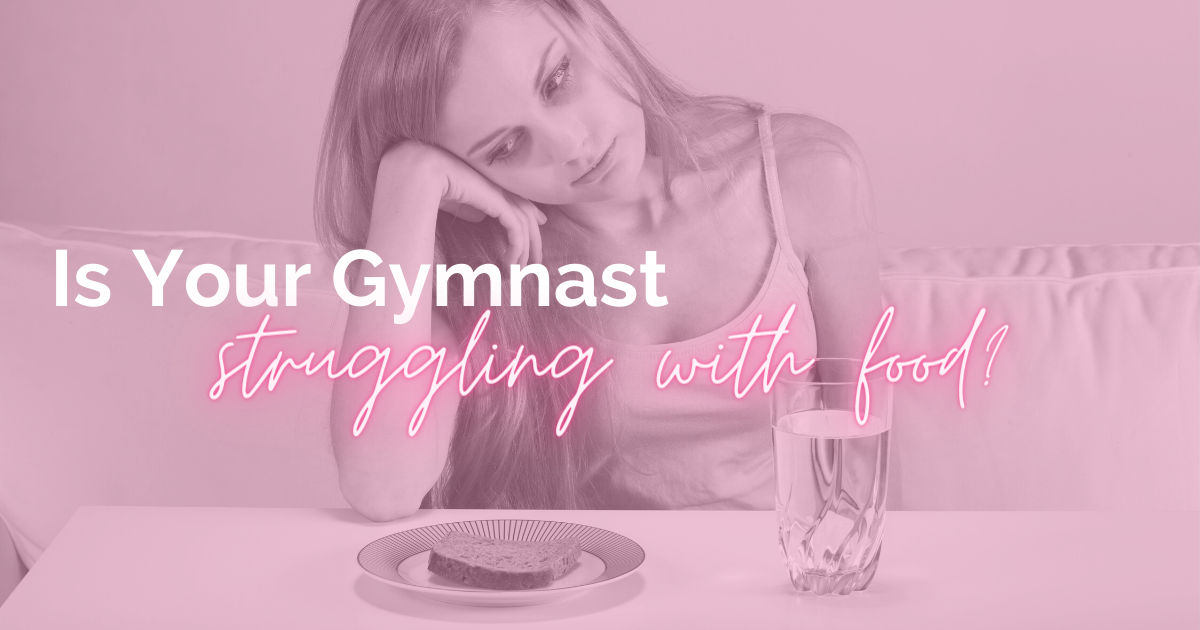explore the blog
free training
The Podcast
Learn to fuel the gymnast for optimal performance and longevity in the sport.
How to Fuel the Gymnast
Learn how to fuel your gymnast so that you can avoid the top 3 major nutrition mistakes that keep most gymnasts stuck, struggling, and injured.
looking for...?
How do you know as a parent or coach if your gymnast is struggling with food or her body?
This week we have another Facebook Live Recap with none other than Dr. Amanda Kaplan. Based out of Scottsdale, Arizona, Dr. Kaplan is no stranger to working with adolescents in the field of disordered eating. She continues to help many young athletes rewire their brains around the topics of body image, food, and self-criticism in a different role than I do, as she is a psychologist. Keep reading if you want an overview of how a parent or coach can catch if their own gymnast is struggling with food and body, and what exactly you can do to help.
Signs your gymnast is struggling with food and her body
Yellow on their way to Red Flags
- Performance and/or mood begins to shift in the gym
- Increased conversations about food
- “I don’t eat this anymore”
- Cutting out specific food groups
- Lots of food rules
- What their and other people’s bodies look like
- Things they used to love doing, turn into things they now do not like doing
- Your gymnast used to love going out to eat with friends and now she doesn’t want to
- Exercise Guilt
- “I feel so guilty for what I just ate, so I guess I’ll just add in an extra work out later”
- Calorie counting
Red Flags
- Not just impacting how they feel, but also forcing their bodies to the extreme
- Exercising
- Not taking an off day
- If they take an off day, severely restrict their food intake
- Not wanting anyone to cook their own foods
Should I Ask My Gymnast What is Going On?
- Best route to take is to just GET CURIOUS
- Ask about the intention
- “I’m curious how come you want to start eating this way?”
- “Why are you worried about adding this extra snack in?”
- Warning signs in your gymnast’s response to these questions
- Defensiveness
- Anxiety
- “I’m Fine”
At What Point Should a Parent Intervene?
- Go with your gut
- Know resistance is normal as it is extremely difficult to open up about these vulnerabilities in their lives
- Obviously, it is ideal for the decision to be mutual, but if your gut is saying there is an issue then take your gymnast to see a third party. Sometimes at the beginning it is a bit forced but over time when they see the results, they will catch on.
- Parents can also reach out on their own without their child to obtain their own education to see what steps to take next
How to respond when your gymnast asks you if “she’s fat”?
Is this a sign there is something deeper going on?
Telling a gymnast “no you are not fat” actually is more harmful than helpful
-
- It invalidates their feelings
- Leads them to close off more and not explain deeper as to what they are feeling
- “What is making you feel that way?”
- It becomes a problem when…
- Constant comments about being fat and wanting to lose weight
- Immense distress around food and exercise. FAT IS NOT A FEELING
- Reminding your gymnast that being “fat” is not a feeling
- “What are the feelings underneath “fat”?” (i.e. anger, fear, guilt, shame, etc.)
Stigma Around Mental Health
What kind of professional to look for?
- A licensed mental health professional
- Specialized training in eating disorders
- Familiar with athletes
- NEDA has a fantastic tool kit and many referrals for eating disorder specialists
- Important to have a therapist and dietitian who work together (that specialize in eating disorders)
- Your gymnast cannot do productive therapy if she is still malnourished
- Having support from a dietician to make sure nutrition gets back on board and a therapist to deal with the emotional piece is the best way to go about helping your gymnast
It can feel really overwhelming as a parent or coach to know your gymnast is struggling with food and her body, especially if those struggles are jeopardizing performance or health. If you would like to learn anymore about Dr. Amanda Kaplan and how she can help your athlete, you can find her at Perspective Therapy.
on the blog
